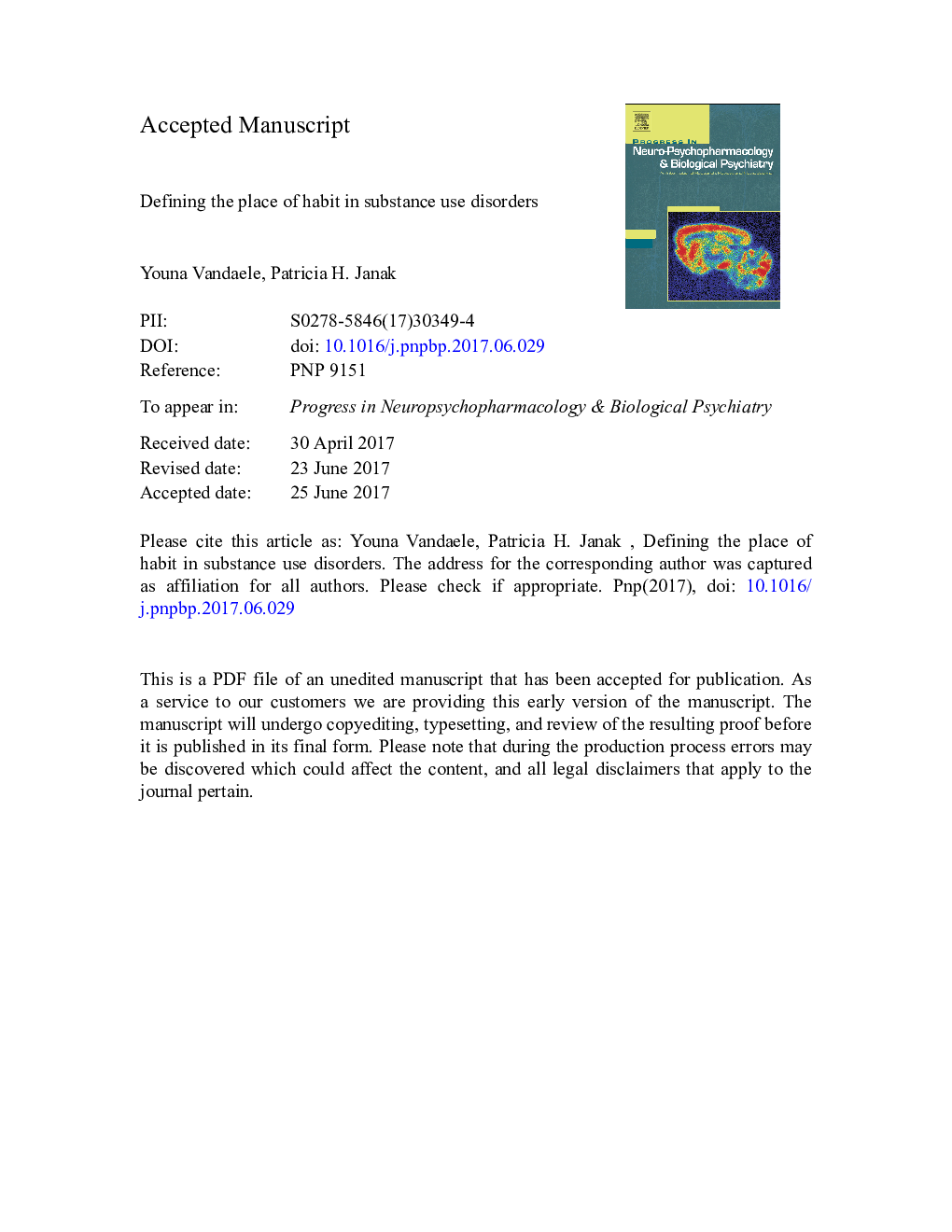| کد مقاله | کد نشریه | سال انتشار | مقاله انگلیسی | نسخه تمام متن |
|---|---|---|---|---|
| 8944023 | 1645224 | 2018 | 30 صفحه PDF | دانلود رایگان |
عنوان انگلیسی مقاله ISI
Defining the place of habit in substance use disorders
ترجمه فارسی عنوان
تعریف مکان عادت در اختلالات مصرف مواد
دانلود مقاله + سفارش ترجمه
دانلود مقاله ISI انگلیسی
رایگان برای ایرانیان
کلمات کلیدی
عادت، هدف هدایت شده، مواد مخدر، اعتیاد، یادگیری، محرک-پاسخ،
ترجمه چکیده
مدتها پیش پیشنهاد شده است که اختلالات مصرف الکل یا مواد از پیشرفت پیشرفت و تسلط عادت های دارویی ناشی می شود. مانند عادات، رفتارهای مرتبط با مواد مخدر اغلب به وسیله نشانه های وابسته به مواد ایجاد می شود. مثل عادت ها، رفتارهای اعتیادآور، قوی، سفت و سخت است. مانند عادات، این رفتارها به نتایج آنها حساس هستند و با وجود پیامدهای منفی آنها را حفظ می کنند. یک متخصص آسیب شناسی به این ترتیب به عنوان یک کاندید خوب برای توضیح گذار به مصرف مواد مخدر به نظر می رسد. با این حال، استفاده از مواد مخدر نیز می تواند به عنوان یک انتخاب هدف هدایت شود که بر اساس انتظارات نتایج مواد مخدر است. به عنوان مثال، معتادان به مواد مخدر ممکن است در رفتارهای جستجوگرانه مواد مخدر دخالت کنند زیرا آنها دارو را به عنوان ارزشمند تر از جایگزین های موجود مشاهده می کنند. بنابراین، اختلالات مصرف مواد ممکن است در مورد عادت و یا به طور کامل عمدی نیست و می تواند به عنوان ناشی از عدم تعادل بین هدف هدایت و کنترل عادت در نظر گرفته شود. هدف اصلی این بررسی این است که سهم نسبی شکل گیری عادت و آسیب دیدگی رفتار هدفمند در این کنترل بی نظیر رفتارهای اعتیاد آور را از بین ببرد. گرچه نقص در رفتار هدایت شده در اختلالات الکل و مصرف مواد نشان داده شده است، اثبات قابل اعتماد از شکل گیری عادت های غیر طبیعی توسط کمبود پارادایم های طراحی شده برای ارزیابی عادت به عنوان یک نتیجه مثبت محدود شده است. بنابراین تصفیه عادت انسان و حیوانات ما به دقت تعیین مکان عادت در اختلالات مصرف مواد و ایجاد درمان مناسب و انعطاف پذیری عصب رفتاری ضروری است.
موضوعات مرتبط
علوم زیستی و بیوفناوری
علم عصب شناسی
روانپزشکی بیولوژیکی
چکیده انگلیسی
It has long been suggested that alcohol or substance use disorders could emerge from the progressive development and dominance of drug habits. Like habits, drug-related behaviors are often triggered by drug-associated cues. Like habits, addictive behaviors are strong, rigid and “hard to break”. Like habits, these behaviors are insensitive to their outcome and persist despite negative consequences. “Pathological habit” thus appears as a good candidate to explain the transition to compulsive drug use. However, drug use could also be considered as a goal-directed choice, driven by the expectation of drug outcomes. For example, drug addicts may engage in drug-seeking behaviors because they view the drug as more valuable than available alternatives. Substance use disorders therefore may not be all about habit, nor fully intentional, and could be considered as resulting from an imbalance between goal-directed and habitual control. The main objective of this review is to disentangle the relative contribution of habit formation and impairment of goal-directed behavior in this unbalanced control of addictive behaviors. Although deficits in goal-directed behavior have been demonstrated in alcohol and substance use disorders, reliable demonstration of abnormal habit formation has been curtailed by the paucity of paradigms designed to assess habit as a positive result. Refining our animal and human model of habit is therefore required to precisely define the place of habit in substance use disorders and develop appropriate and adapted neurobehavioral treatments.
ناشر
Database: Elsevier - ScienceDirect (ساینس دایرکت)
Journal: Progress in Neuro-Psychopharmacology and Biological Psychiatry - Volume 87, Part A, 20 December 2018, Pages 22-32
Journal: Progress in Neuro-Psychopharmacology and Biological Psychiatry - Volume 87, Part A, 20 December 2018, Pages 22-32
نویسندگان
Youna Vandaele, Patricia H. Janak,
